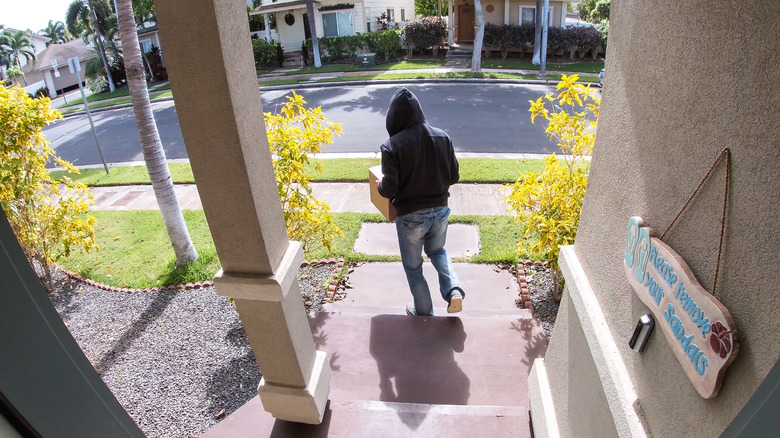The Cheap Amazon Video Doorbells That You Absolutely Shouldn't Buy
Not only are video doorbells a huge boon to your home security, but they can also help with more mundane tasks like letting you know when you have a package waiting at your door. There are a lot of different brands that make these nifty gadgets, and many of them are available on storefronts like Amazon. Some are from trusted brands like Blink, Google Nest, Wyze, and Amazon's own line of Ring products. But then some might not be as trustworthy.
Consumer Reports recently published a piece where it described one of its journalists — Stacey Higginbotham — receiving an email containing an image of herself waiving at her own home doorbell camera. This message was sent by one of Consumer Report's own privacy and security engineers, Steve Blair. Blair hacked into Higginbotham's doorbell from the other side of the country in order to show how dangerously vulnerable the software protecting this video footage actually was.
This is certainly not a pleasant revelation. These products are designed and marketed as tools to help us feel safe, so you definitely don't want anyone with a computer able to access your home feed. It seems that Blair managed to do this by exploiting security risks that were common in home doorbell cameras made by certain companies.
Some video doorbells are best avoided
Blair's fellow test engineer, David Della Rocca, discovered several brands that share a manufacturer, and thus share several serious security risks. Blair claimed that exploiting these risks was how he gained access to Higginbotham's home network, and that all of them were missing a legally required visible ID issued by the Federal Communications Commission. This actually means that these doorbells aren't just unsafe, but it's actually illegal to distribute them in the U.S.
Consumer Reports then went on to state that thousands of these products are sold every month across multiple major marketplaces, and listed several brands of video doorbells that are the most vulnerable to these kinds of attacks. The first two were called Eken and Tuck.
"The two devices stood out not just because of the security problems but also because they appeared to be identical, right down to the plain white box they came in, despite having different brand names," Consumer Reports stated. Additional research later in the report yielded that over 10 additional smart doorbells, sold under a variety of separate brand names, were all controlled by the same "Aiwit" mobile app — developed by the aforementioned Eken.
Consumer Reports also claimed that it later tested doorbells from the brands Fishbot and Rakeblue and found the same security flaws. It is recommended that owners of these video doorbells disconnect them from their Wi-Fi immediately and replace them with a different, verifiably secure camera doorbell.

